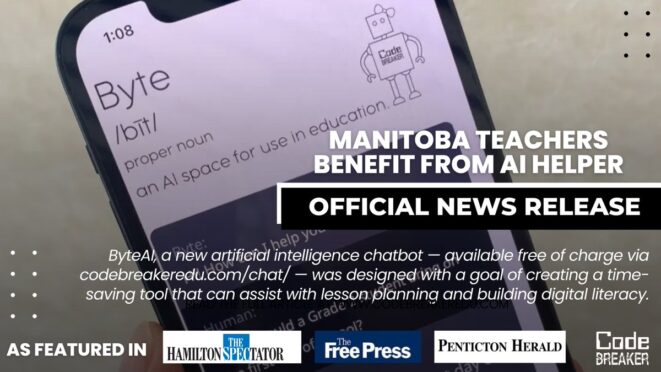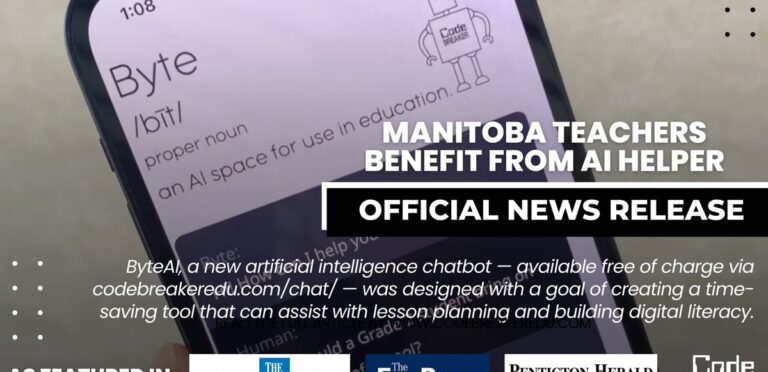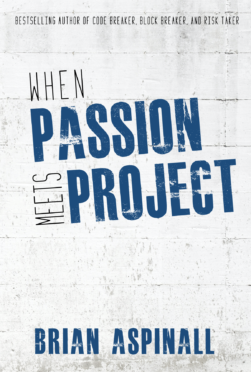Tech-savvy teachers across the province are adding ByteAI to their back-to-school supply lists.
By Maggie Macintosh, Local Journalism Initiative Reporter Winnipeg Free Press
Friday, August 25, 2023, 2 min to read
Originally Posted on The Winnipeg Free Press, Hamilton Spectator and Penticton Herald.

Tech-savvy teachers across the province are adding ByteAI to their back-to-school supply lists.
The new artificial intelligence chatbot — available free via codebreakeredu.com/chat/ — was designed in collaboration with Manitoba teachers to create a time-saving tool that can assist with lesson planning and building digital literacy.
“I really like the saying, ‘You should use technology to replace things that should be replaced,’” said Kirsten Thompson, president of the Manitoba Association of Educational Technology Leaders.
Thompson wants to shift the “fearmongering” narrative surrounding generative AI so it is not regarded as a frightening technological advancement, but rather an addition that can be leveraged for critical thinking and learning at-large.
Earlier this year, the group partnered with Code Breaker Inc., an education consulting firm founded by an Ontario elementary teacher, who has a background in computer science, to launch an AI platform for specific use in education.
Simply put, ByteAI is an offshoot of OpenAI’s ChatGPT — the groundbreaking chatbot that went online in November 2022 and began providing human-like answers to user prompts of all kinds — and draws on the original technology’s mainframe.
It’s unique because users do not have to enter any personal information and the robot does not track student information. In addition, it will not entertain inappropriate questions, Thompson said, noting school privacy and code of conduct policies were top of mind as it was being developed.
Teachers can ask the robot to write everything from seating charts to specific classroom activities tailored to any grade and subject.
For students, the chatbot can simplify the research process because they can request extensive background information in one place.
Thompson is a proponent of teachers using ByteAI alongside their students to emphasize its data-gathering process and encourage critical thinking about what the chatbot produces.
“Analysis is a really deep part of our (English Language Arts) curriculum and so, being able to deconstruct a piece of written work in order to determine potential bias and language choices is something we’re hoping students will do in all types of literacy,” she said. “AI should be no different.”
The association has signed a three-year sponsorship agreement with Code Breaker. It has earmarked $2,500 annually to operate ByteAI and in turn, advance its mandate to bridge the gap between technology and curriculum.
Generative AI is “consuming” conversations across the sector and all signs suggest it will continue being embedded into everyday tools like email servers that now provide suggested replies, said Brenda Stoesz of the University of Manitoba’s Centre for the Advancement of Teaching and Learning.
“I think that’s a good thing because it makes us think again about the purpose of learning and the purpose of what we’re doing. Disruption is OK because it challenges us,” said Stoesz, a research lead at the centre with expertise in AI and academic integrity.
The rapid growth of this technology over the last year should prompt users to consider its ethical implications, including a tool’s biases, the greenhouse gas emissions required to power it, and when it is appropriate to access, she said.
In recent months, Stoesz has been running workshops to teach academics about the ever-growing AI landscape and discuss these robots’ existence with students in the context of academic integrity.
While these tools can kick-start learning by facilitating brainstorming sessions, they can also ensure students “bypass the learning and gain unfair advantage by not engaging in that learning process at all,” said the founder of the Manitoba Academic Integrity Network.
Stoesz likens tools such as ChatGPT, ByteAI and Google Bard to calculators. External devices can be of use in some situations, but they are no replacement for the benefits of being able to multiply in one’s head or do other basic math in an instant, she noted.
While noting the sudden rise of remote learning during the COVID-19 pandemic appeared to signal a new era of education, Stoesz added handwriting and hard copies are making a comeback as teachers undertake assessment at a time when robots can write essays in seconds.
Manitoba’s online high school recently bolstered its standard disciplinary protocols in a bid to deter students from submitting AI-plagiarized work as their own amid what the InformNet principal described as a “concerning rise” in incidents.
maggie.macintosh@freepress.mb.ca – The Canadian Press. All rights reserved.

 For all the kids who grow up in a small town and think they don’t stand a chance. You do. I was once that kid.
For all the kids who grow up in a small town and think they don’t stand a chance. You do. I was once that kid.